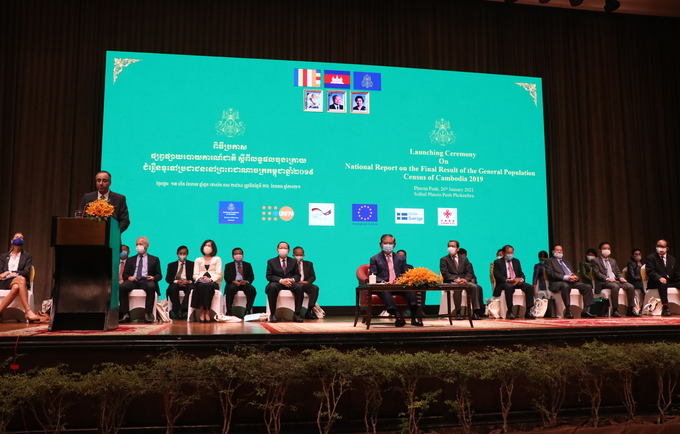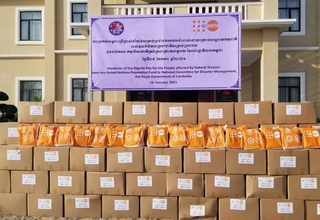REMARKS
Daniel Alemu, UNFPA Representative, a.i.
Introduction
- Samdech Kralahorm SAR KHENG, Deputy Prime Minister, Minister of the Interior, and the Chairman of the National General Population Census Committee of the Kingdom of Cambodia
- Excellency Kitti Settha Pandita CHHAY THAN, Senior Minister, Minister of Planning, and the Vice-Chairman of the National General Population Census Committee
- Excellencies Ministers, Provincial Governors and all Representative from Government
- Excellencies Ambassadors,
- Representatives from Development Partners, UN Agencies and NGOs/CSOs
- Distinguished guests, ladies and gentlemen, Good morning!
On behalf of UNFPA Cambodia, I am honored and humbled to join today’s official launch of the Kingdom of Cambodia’s 2019 General Population Census final results officiated by Samdech Kralahorm SAR KHENG, Deputy Prime Minister, Minister of the Interior, and Chairman of the National General Population Census Committee.
A census is among the most complex and massive peacetime exercises that a nation undertakes necessitating a large-scale mobilization from top to bottom. This particular fourth population census in Cambodia has been undertaken under unprecedented challenges related to the COVID19 pandemic. This coupled with initial funding shortfalls and capacity gaps made this particular census quite complex. As such, I would like to express from the onset my sincere appreciation and gratitude to the National General Population Census Committee chaired by Deputy Prime Minister Samdech Kralahorm SAR KHENG, the Ministry of Planning and the National Institute of Statistics for closely chaperoning the census process leading to its successful conclusion.
Excellencies, Ladies and Gentlemen,
With less than 10 years remaining to achieving the 2030 Agenda, it should be made clear that we cannot realize the SDGs’ principle of Leaving No One Behind without accurate and disaggregated data and statistics. The COVID19 pandemic has only driven home the critical need for data and statistics. As the primary source of data on the size and spatial distribution of the population and its characteristics, the census underpins national data ecosystems, providing population denominators for SDG national development indicators, and the master sampling frames for all national and subnational surveys. For policy-makers, it provides an indispensable source of information to count the invisible, and identify vulnerable groups for more effective social targeting. It also uncovers underlying demographic trends that help set policy agendas and entice commensurate investments in specific sectors.
It is in recognition of this fact that member states decided to include a standalone target under SDG 17 to be achieved by 2020 on enhancing capacity building support to increase the availability of high-quality, timely and reliable data. While some progress has been made, challenges still persist.
UNESCAP’s 2020 SDG Progress Report clearly indicates that while overall data availability on the SDGs indicators has substantially increased over the past few years in Asia and the Pacific, data are still lacking on over half of the SDG indicators. Furthermore, on financing for data, while official development assistance (ODA) for data and statistics has risen globally by 11% according to the United Nation’s 2020 Sustainable Development Goals Report, “international funding for data and statistics is still about half the level it needs to be”. When we look at the Eastern and South-Eastern Asia sub-region, total official development assistance dedicated to statistical capacity building activities had actually declined from USD 44.6 million in the period 2014-2016 to USD 38 million for the period 2015-2017. These trends may indicate the need for even stronger government ownership, coordination and funding of statistical activities if countries in the region are to effectively track and achieve the SDGs and their national development goals.
Cambodia has made considerable investments in data and statistics over the years leading up to the 2019 census. Under the leadership of the Ministry of Planning and the National Institute of Statistics (NIS), the Statistical Law of December 2015 was promulgated, and a five-year National Strategy for the Development of Statistics (NSDS) was developed in November 2018. Government financing for statistics has also been gradually increasing best exemplified by the funding for this 2019 round of census. While commendable progress, reforms targeting the further modernization of the statistical system in Cambodia, the integration of new technologies for data generation and dissemination, the use of big data, and investments in human resources are still required.
To allow the country to continue its development journey on a sustainable development path, and support its transition to a digital economy, Cambodia needs to fully embrace the centrality of a well-coordinated and funded national statistical system.
Excellencies, Ladies and Gentlemen,
The 2019 census results launched today reveal a number of demographic trends characterizing today’s Cambodia. With a population of 15.5 million people, a growth of roughly 16% since the 2008 census, Cambodia is witnessing a declining fertility and slower population growth rates undoubtedly influenced by years of successful implementation of reproductive health programmes by the government. The proportion of children under 15 years has gradually decreased contrasted with the increase in the population aged 60 years and over with the overall median age increasing from 22 years to 27 years over the last ten years. While this reflects a pattern of steady decline in fertility and adult mortality, it also indicates that the population is shifting away from a young age structure towards a more intermediate age structure that is slowly ageing. This may call for more accelerated and targeted investments in young people to allow Cambodia to reap its demographic dividend.
At the same time, it is noteworthy that the urban population in Cambodia has doubled between 2008 and 2019, with migratory patterns predominantly inter-provincial and lifetime migrants (persons not living in their place of birth) constituting 21.7 percent of the general population. This comes against the backdrop of a general decline in migratory movements perhaps characteristic of a rapidly urbanizing population.
The above demographic trends also characteristic of other countries in Asia point to a steady ageing population that is increasingly urban with changing migration patterns. While further investigation and analysis is required, some of the policy implications could be accelerated investment in social sectors to ensure young people are more equipped to help the country realize its demographic dividend. At the same time, a paradigm shift towards a life-cycle approach focusing on all human developmental stages may be necessary to ensure a more healthy ageing. This may necessitate investments in social protection policies and programmes to strengthen the welfare state in Cambodia on the one hand, while ensuring adequate investments in a health system attuned more towards non-communicable diseases on the other. Moreover, policies that respond to the social, economic and environmental effects of rapid urbanization must be designed and prioritized.
The data generated by the census capturing the above mentioned demographic trends once analyzed will certainly provide a solid basis for government and all stakeholders to pursue evidence-informed and rights-based economic and social policies targeting the most vulnerable. In addition, it will also provide much-needed evidence for national and sub-national level authorities to better track inequality and ensure a more equitable access to quality services as well as help promote accountable and good governance systems.
Excellencies, Ladies and Gentlemen,
Since its inception, one of UNFPA’s core mandates has been to strengthen national capacities to ensure that population censuses are of high quality and uphold international principles and standards. In Cambodia, as co-chair of the Data for Development Sub-Working Group, UNFPA has been closely coordinating together with the Royal Government of Cambodia and development partners to provide quality assurance to the census operation, and mobilize technical and financial support to fill critical gaps in the census process. It is this collective commitment of all partners under the leadership of the government that allowed us to reach this historic milestone today. Allow me therefore to take this opportunity to express my profound gratitude to the development partners who have provided invaluable technical and financial support to ensure the success of the census operation. These include the GIZ, the European Union, and SIDA. Furthermore, I am equally thankful to all partners who have pledged and committed to support the further analysis of the census data including the Asia Development Bank, the European Union, the Australian Government, the World Bank, and the United Nations system agencies here in Cambodia.
Excellencies, Ladies and Gentlemen,
Before I conclude, I would like to reiterate again the importance of availing timely, quality and disaggregated data for development. While a complex and costly exercise, censuses remain the most effective instrument to enumerate and record information on the entire population in a given country. We must continue our investment in censuses while also introducing more innovative and complementary data generation instruments, because simply everyone counts and no one irrespective of age, sex, or ethnicity should be left behind.
Allow me finally to end by thanking again the Royal Government of Cambodia, and specifically Kralahorm SAR KHENG Deputy Prime Minister, Minister of the Interior, and the Chairman of the National General Population Census Committee, and His Excellency CHHAY THAN, Senior Minister of Planning, and Vice-Chairman of the National General Population Census Committee, all members of the National General Population Census Committee, the leadership and staff of the National Institute of Statistics as well as all government partners and development partners for the leadership and support in making this 2019 census a great success.
Together we can ensure that the aspirations of all people in Cambodia towards equality, choices and rights is realized because everyone does count.
Thank you (Or Kun) !...


